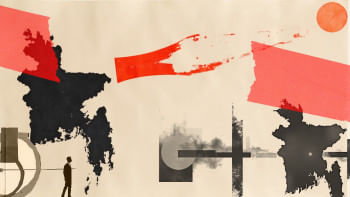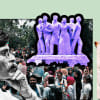What are we building after dismantling the AL regime?

After removing the oppressive and corrupt Hasina government, we were supposed to restore democracy, end all sorts of discrimination, give the country honest and accountable governance, freedom, rights, an efficient and corruption-free bureaucracy, and many other things.
But are we doing so?
We were angry at Sheikh Hasina because she subverted democracy, establishing which was our dream from the very inception of Bangladesh. We rejected her because of the arrogance and arbitrariness of her person. She totally lost our confidence when people did not matter to her. She failed to sense the people's pulse when a wall of corruption disconnected her party and the people. Finally, she lost power when, instead of listening to the students and the general people, she opted to shoot them down—at least 1,400 of them, with a far higher number of injured, according to UN findings. With all said and done, it was Sheikh Hasina's destruction of democracy that caused her fall.
Has anything happened recently in Bangladesh that can strengthen our faith that we are moving towards democracy? Is there anything in the present governance process that reflects the people's views, save for those who are adept in the use of social media, possess extraordinary agility to mobilise, can gather quickly, assert their views powerfully, make threats to the government, give ultimatum and see the government wilting under threats? We repeat, we have successfully destroyed Hasina's power-monopolising and freedom-stifling regime. But what have we replaced it with?
Democracy does not seem to be our focus today. Because if it were, then shouldn't we have been talking about elections more? Chief Adviser Prof Muhammad Yunus keeps referring to the time frame of December 2025 to June 2026. He has been doing so from the beginning. If he prefers June '26, then he should clearly say so and move in that direction. The debate over the date should now be put to rest. It is harming the credibility of a person we trust and respect, especially because it is well-known that some of his cabinet members are far too enamoured with their present positions, so much so that they want to continue in power, for which they want the election postponed under the guise of reforms. If we look into their respective ministries, have we seen any reforms or even the slightest change in the methods of operation, or some suggestions in this regard to the cabinet?
The six major reform commissions submitted their reports on January 15 this year. Yesterday marked four months since their submission. Shouldn't we have had a clearer picture on the agreed reforms by now? We accept that reaching consensus is more complicated than compiling reports. However, we think a clearer picture should have emerged by now because time is of essence, and four months is not too short a period. Yes, there are many political parties, but the ones that have large public support are few. So the situation is simpler than it appears to be. Reaching some sort of agreement on reforms is directly linked with holding the election, and hence the slow pace of reaching it gives birth to uneasy questions.
The interim government must be aware of the extent of its mandate and solidity of its tenure. The mandate was for reforms and a speedy transition from an unelected government to an elected one. Prof Yunus did a brilliant job of formulating significant reforms and putting them before the nation and the political parties. And he did so in good time.
However, as for the solidity of its tenure, the interim government doesn't seem to be as aware of its weaknesses as it should be. The only person who can be said to have some sort of people's support is Prof Yunus. He is the only one who, without any voting process, can be said to have been accepted by the people to govern the country for a specific period. But what about the rest of his cabinet members? What sort of public acceptability do they enjoy? It is widely known that when Prof Yunus took the oath of office, he did not personally know many of his cabinet members. In the present cabinet, there are some who have had a long record of public service and professional reputation. But there are others who are not as well-known. Some of them were flown in from abroad and imposed on us without adequate information.
The question that is now being raised is about the lack of transparency in this whole process. The chief adviser, of course, determines when he needs additional help. But after his decision, what is the selection process? No public announcement is made and suddenly we are told so and so has joined the government from so and so place, with such and such responsibility. There are instances of an old boys network working here.
Can Prof Yunus run his time-bound and agenda-laden government with people with such diverse and disparate backgrounds, some of whom have little experience of running a government? I fully acknowledge their expertise and respect them for it, but unless they have experience in navigating through our bureaucratic web, know how to deal with various groups with different agendas, and have personal exposure in handling our specific and sometimes not-so-cooperative cultural traits, they cannot be effective policymakers and much less implementers.
Others who have experience of running a government are also not showing the level of effectiveness that is required at the moment. Opening any newspaper or TV channel—of course, we are the villains—will show how urban life has become unpredictable and unaffordable and rural life unsafe.
Without questioning anyone's abilities, a look at the portfolio distribution among the advisers gives us an idea of the existing chaos. We have given the task of home affairs—which includes internal security—and agriculture to the same person. Is it doable? Isn't home affairs far too complex and a 24/7 job? When does he have time for agriculture, which is one of the three pillars on which we are surviving, the other two being RMG and remittance? Don't farmers deserve an adviser? Then we put law and expatriate welfare ministries together. As a result, we have a country full of journalists accused of murder, and the legal system has been "weaponised" to harass and intimidate a section of the citizens and extort money. The law and expatriate welfare adviser is currently visiting Malaysia and has urged the workers to "please directly communicate with me" and collect his email and phone number. Institution-building, indeed. Don't the expatriate community, who gave us around $23 billion last year and nearly the same amount for many years, deserve an adviser of their own? Prioritising indeed. Another adviser has power, energy and mineral resources, road transport and bridges, and railways. Can one person effectively serve so many vital sectors? We have a foreign affairs adviser, a special envoy to the chief adviser on international affairs, and a special assistant on foreign affairs. Do we need three? What have they done so far? For the first time in the country's history, we have a national security adviser with the additional task of advising the chief adviser on defence matters, and Rohingya affairs. His experience on national security and defence matters are totally unknown to the people of this country. His initiative on the "humanitarian corridor," which he prefers to call a "channel," has seriously raised justifiable concerns throughout the country and alarmed all defence establishments, especially as they were bypassed in whatever negotiations or talks that have taken place so far.
What are we to make of all this? We think the present reality and the government's inability to handle everyday affairs, especially on law and governance, give us the answer. As matter stands now, it is Prof Yunus's personal prestige, his well-known commitment, people's trust, and the international community's confidence in him that's helping us overcome the present challenges.
We should not take this for granted for too long. The best option is to get ourselves an elected government and restart our democratic journey, however flawed. We are aware that there exists a lot of doubt about our political parties' sincerity and ability to serve the people well. We also doubt their trustworthiness as they have a record of promising the moon and delivering very little. But the only way to find that out would be to elect one. Continuing with an unelected government based on one person's prestige, trust, and goodwill is not a way for a nation to proceed. And this is something a man like Prof Yunus should not permit for long.
Mahfuz Anam is the editor and publisher of The Daily Star.
Views expressed in this article are the author's own.
Follow The Daily Star Opinion on Facebook for the latest opinions, commentaries and analyses by experts and professionals. To contribute your article or letter to The Daily Star Opinion, see our guidelines for submission.

 For all latest news, follow The Daily Star's Google News channel.
For all latest news, follow The Daily Star's Google News channel. 










Comments